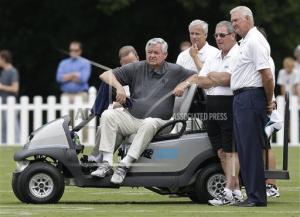NFL’s Panthers owner gives generously – after taxpayers pay for his stadium upgrades

FREE RIDE: Carolina Panthers owner Jerry Richardson at training camp, July 2013.
By Paul Chesser | Special to Watchdog.org
While the city of Charlotte granted him $87.5 million in April 2013 to help pay for improvements to Bank of America Stadium where his Carolina Panthers play, team owner Jerry Richardson has given from his own wealth to colleges for sports and arts venues that will bear the imprint of his family name.
Wofford College, in Spartanburg, S.C., on Monday announced that Richardson has “provided the gift to fund” a 92,000-square-foot on-campus facility that will house a 3,400-seat arena for the basketball team and a 500-seat space for volleyball.
The announcement followed Richard’s donation to Wofford less than a month ago to build a center for the study of theatre arts, visual arts and art history, including a 300-seat performance hall and a museum.
Wofford’s new athletic venue will be called Jerry Richardson Indoor Stadium. The Rosalind S. Richardson Center for the Arts will be named for his wife, a trustee for the college and also an alumnus.
In 2011, Richardson contributed an undisclosed amount to the University of North Carolina at Charlotte for its new football program, and followed with a $10.25 million donation last year for what is now called Jerry Richardson Stadium.
As the Charlotte Business Journal reported in June 2013, Richardson’s generosity “is quite a juxtaposition from the stance (he) took during negotiations with city government this year to secure $87.5 million in taxpayer money for upgrades at privately owned Bank of America Stadium.”
Indeed, Richardson wanted more than just the public’s money from the Queen City. He also devoted significant time and energy trying to extricate a combined $200-million package from the city and the State of North Carolina, but was turned down by legislators and Gov. Pat McCrory.
Throughout the negotiations hovered the threat that the Panthers would leave Charlotte, possibly for NFL-less Los Angeles, with the head of the Chamber of Commerce saying, “That reality scares the hell out of me. It’s sobering.”
In January 2013, Democrat City Councilman Michael Barnes asked Richardson why the Panthers couldn’t invest more of its own money in the upgrades. His response, according to city transcripts (and the Business Journal) was, “I could load it up just like you could. You could use your credit card up, that is an option, but I’m not going to do that. I don’t think it’s reasonable.”
Obviously dedicating millions of dollars to athletics at his South Carolina alma mater and his home city’s state university campus are more to Richardson’s liking. Wofford, a private school, would not disclose the amount of their alumnus’s gift or the cost of the new facilities, but the size and scope of the Indoor Stadium and Arts Center point to costs well into eight figures.
“It’s good that (Richardson) has given voluntarily to support new athletic facilities at Wofford College and UNC-Charlotte,” said Jon Sanders, director of regulatory studies at the free-market focused John Locke Foundation in Raleigh. “The same cannot be said for coercing taxpayers’ involuntary support of upgraded facilities for his highly profitable business.”
Last year Forbes valued the Panthers at $1 billion, and NFL documents leaked to sports website Deadspin showed the team had a $112-million profit over the two-year fiscal period for 2010 and 2011, despite its dismal on-field record.
University of Oregon business professor Dennis Howard said of the Panthers’ financials, “This team is pretty damn healthy,” and characterized NFL ownership in general as “a license to print money.”
Another Forbes analysis characterized the $87.5-million gift from Charlotte taxpayers as the “third-most lucrative subsidy in the history of football,” based upon the amount of the public money it received, divided by the number of years the team is committed to remain in the city.
Nevertheless, the Panthers’ maintain that the public “investment” in the stadium’s renovations were needed, and more than fair. According to the team’s director of communications, Charlie Dayton, during the past year the Panthers contributed $36 million of $64 million spent so far. The Deadspin report estimated total costs of upgrades would eventually cost $300 million of which Richardson hoped taxpayers would cover $200 million, but it is unclear how much the team plans to spend now.
“Prior to this year’s renovations,” Dayton said in an email, “the team had spent approximately $550 million in building, financing, capital improvements, and operating expenses on Bank of America Stadium, making it one of the most privately funded stadiums in the country.”







